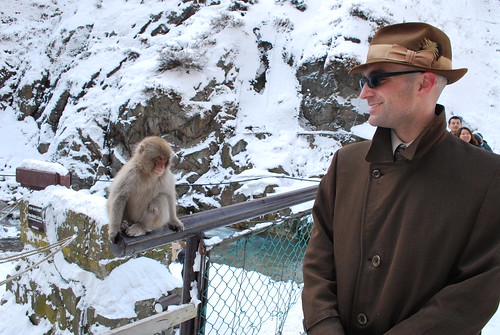
{Photo of my hat at risk by rocketlass.}
I've always thought that the primary influences on P. G. Wodehouse's gloriously funny work are fairly easy to spot: Shakespeare and the Bible provide most of his references and many of his cadences, while musical theatre, particularly Gilbert and Sullivan, inspire the energetic joking and intricate plotting. Reading The Pickwick Papers makes me realize, with some surprise, that hitherto I've missed a quite obvious one: Dickens.
Take this scene, which finds Mr. Pickwick chasing his hat, which has blown off his head and is "gambolling playfully away in perspective":
There are very few moments in a man's existence, when he experiences so much ludicrous distress, or meets with so little charitable commiseration, as when he is in pursuit of his own hat. A vast deal of coolness, and a peculiar degree of judgment, are requisite in catching a hat. A man must not be precipitate, or he runs over it: he must not rush into the opposite extreme, or he loses it altogether. The best way is, to keep gently up with the object of pursuit, to be wary and autious, to watch your opportunity well, get gradually before it, then make a rapid dive, seize it by the crown, and stick it firmly on your head: smiling pleasantly all the time, as if you thought it as good a joke as anybody else.A narrator pausing the action to deliver a brief analysis, followed by seriously given instructions for an utterly unserious action--can you get more Wodehousian? Dickens's humor is so through-and-through lighthearted in Pickwick that its place as an ancestor to Wodehouse's work is much more clear than in the later novels, with their surrounding darkness.
There was a fine gentle wind, and Mr Pickwick's hat rolled sportively before it. The wind puffed, and Mr Pickwick puffed, and the hat rolled over and over as merrily as a lively porpoise in a strong tide.
In fact, to draw out the chain by one more link, the same is true for Dickens's own debt to the narrative verve and mock-seriousness of Henry Fielding--it's much more obvious in the playfulness of Pickwick than in the seriousness, of, say, Dombey and Son. Not that Dickens's admiration for Fielding is any sort of secret: he did, after all, name his eighth child Henry Fielding Dickens.
Hat, monkey! Delightful...
ReplyDeleteFor someone who has read relatively little Dickens (ToTC, Great Expectations, CC) but lots of other Victorian novels, which next? I've been thinking about Bleak House? Pickwick does sound fun, though. I love your blog, by the way.
ReplyDeleteSelena,
ReplyDeleteThanks for the kind comment!
My favorite Dickens is Our Mutual Friend, though I don't know that it's the right place to begin a trip through the heavier Dickens. You're probably right in thinking Bleak House--it's where he really starts to spread his wings, in terms of language, characterization, social commentary, and complexity. But I'm also very partial to Dombey and Son and Little Dorrit.
Thanks. I'll probably go with Bleak House, then.
ReplyDeleteI wonder if Thackeray was another influence on P.G. Wodehouse. That struck me as I read the Book of Snobs.
ReplyDelete